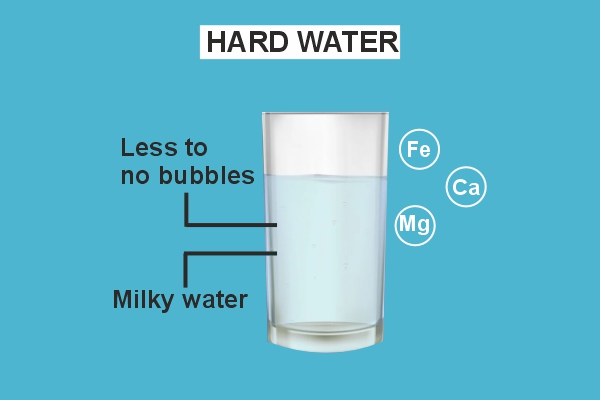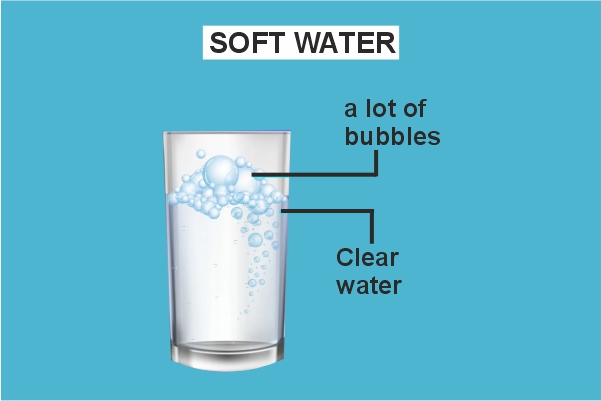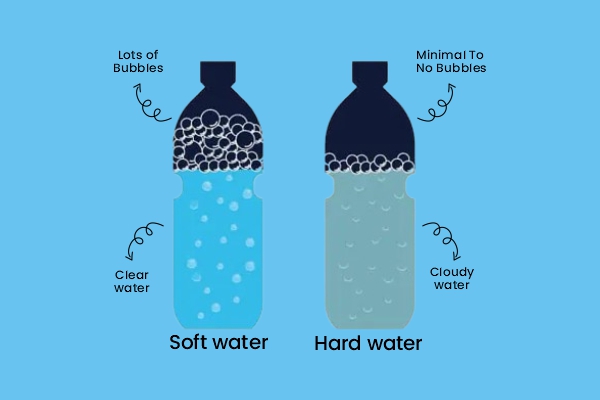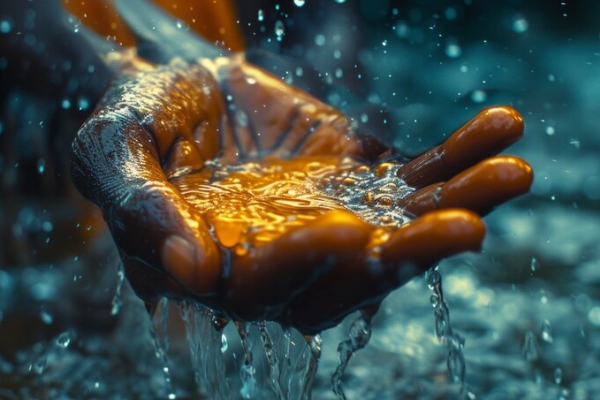Water is essential for life, but not all water is the same. The two most common types of water are hard water and soft water. While both are safe for various uses, the differences between them can have significant impacts on your household, appliances, skin, and even health. Understanding the difference between hard water and soft water can help you in making decisions about which type of water is better for your daily needs, whether it is for drinking, cleaning or ensuring the longer age of your household appliances.
What is Hard Water?

Hard water is a type of water that contains a high level of dissolved minerals, such as calcium and magnesium. These minerals are naturally absorbed as water flows through different rock formations, especially those which are rich in limestone and other sedimentary rocks. These minerals increase the hardness of water. The difference between hard water and soft water is mainly the mineral content, which affects how the water behaves in household tasks, appliances, and even on your skin. The minerals present in hard water interfere with the ability of soap to create a foamy lather, resulting in fewer bubbles and makes the cleaning less effective.
Advantages of Hard Water:
- Mineral Enrichment: Hard Water contains beneficial minerals like calcium and magnesium, which are crucial for overall health, especially in promoting strong bones and teeth.
- Taste: Some individuals enjoy the unique flavour of hard water, as the minerals present can add a distinct taste to the water.
- Potential Health Benefits: Research indicates that consuming moderate amounts of minerals may have a beneficial impact on cardiovascular health and potentially lower the risk of certain diseases.
- Natural source: Hard water is typically obtained from underground aquifers and wells, which can be a more sustainable option compared to solely relying on treated water or packaged drinking water.
Disadvantages of Hard Water:
- Scaling: Mineral deposits from hard water accumulate in pipes and plumbing fixtures, leading to reduced water flow and efficiency over time.
- Cleaning challenges: If you live in a hard water area, you need more soap and detergent to lather.
- Damage to appliances: Buildup of minerals inside water heaters, dishwashers, and washing machines can shorten their lifespans and cost you more money in maintenance.
- Skin and Hair Effects: The hard water minerals can leave a sticky layer on the skin and hair, which results in dryness, itching, etc. and can make your hair look dull and difficult to style
What is Soft Water?

Soft water contains very low levels of calcium and magnesium ions. It naturally occurs in areas where water does not pick up minerals from rocks. It can also be created through a process called water softening, where calcium and magnesium ions are replaced with sodium ions. Soft water is often preferred for household use due to its cleaning efficiency.
Advantages of Soft Water:
- Better Cleaning: Soaps and detergents lather better in soft water, thus making them more effective for cleaning.
- Gentle on Clothes: Soft water is gentle on clothes when doing laundry, preserving color and texture over time.
- Reduces Scale Buildup: Soft water has low levels of calcium and magnesium, which reduces scale buildup in water-using appliances such as water heaters, coffee makers, and dishwashers, increasing their lifespan.
Disadvantages of Soft Water:
- Not suitable for drinking: Water softening often involves replacing calcium and magnesium ions with sodium ions. Softened water with high sodium levels may not be suitable for drinking, especially for people who are on sodium-restricted diets.
- Environmental concerns: The process of softening water can involve the discharge of brine (salty wastewater) into waterways, which can harm aquatic life.
- Potential Health Concerns: Softened water may lack the beneficial minerals that are required by our body for better functioning.
- Maintenance costs: Water softening requires ongoing maintenance and regeneration of softening systems, which can add to household expenses.
Difference Between Hard Water and Soft Water

Soft water:
- Lathering: Effortlessly lathers with soap, enhancing the efficiency of cleaning without damaging your household appliances and clothing fabric.
- Soap usage: Requires less soap for washing, resulting in cost savings.
- Mineral composition: Low in calcium and magnesium salts (Chloride, Sulphate, Bicarbonate).
- Suitability for Drinking: Drinking soft water is not recommended as it lacks essential minerals that are necessary for proper hydration of your body.
- Appliance impact: Does not lead to scaling or rapid deterioration of boilers and appliances.
Hard water:
- Lathering: Generates less lather with soap, and hence needs additional amounts for proper cleaning.
- Soap Usage: More costly for washing or cleaning due to higher soap consumption.
- Mineral Composition: Rich in Calcium and Magnesium salts (Chloride, Sulphate, Bicarbonate).
- Suitability for Drinking: Can be used for drinking purposes as it contains beneficial minerals and can be used for drinking purposes.
- Appliance Impact: The presence of minerals in the water can lead to scaling and shorten the lifespan of boilers and appliances.
Is Rainwater Hard or Soft Water?

Rainwater is classified as naturally soft because it contains low levels of dissolved minerals like calcium and magnesium. When precipitation occurs in the form of rain, it is generally clean and empty of the mineral deposits commonly associated with hard water. As rainwater passes through the atmosphere, it absorbs carbon dioxide and becomes slightly acidic.
When it seeps into the ground, it can collect some minerals, but generally, rainwater remains softer than groundwater.
Key Points of Rainwater:
- Softness: Rainwater is naturally soft because it has a low mineral content.
- Acidity: It absorbs carbon dioxide from the atmosphere, resulting in a slightly acidic environment.
- Groundwater influence: As rainwater seeps into the ground, it may absorb minerals but typically remains softer than groundwater.
- Usage: Rainwater is suitable for various non-potable uses such as watering plants, cleaning vehicles, drinking and other applications where the presence of minerals is not a concern.
Conclusion
The difference between hard water and soft water is based on mineral content and its effects on cleaning, appliances, and health. Hard water is rich in calcium and magnesium but also causes scaling and cleaning challenges. On the other hand, soft water is low in minerals but ideal for household use because it increases the lifespan of your appliances and is also good for your skin and hair, though it may lack some health benefits. Whether you prefer the natural minerals of hard water or the appliance-friendly properties of soft water, knowing these key differences ensures you can make informed decisions for your home and health.
